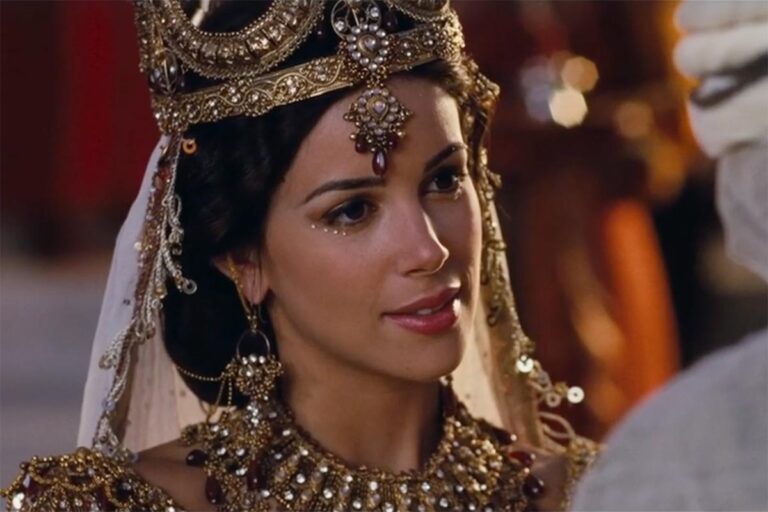
#There are never enough Jewish holiday movies.
The holiday of Purim is a time when Jews traditionally congregate to read Megillat Esther, a story filled with intrigue, emotions, violence, and more. And yet, while a holiday like Passover has the incredible films “The Ten Commandments” and “The Prince of Egypt,” Purim has no such movie.
Until someone makes an ageless classic worthy of turning on every Purim, we need to find something to watch.
To try to help you have something to put on during your Purim revelry and celebration, I watched every single adaptation of the Book of Esther I could get my hands on (including one over a century old — Louis Feuillade’s “Esther” is not reviewed here as it’s only available in archives, but it’s worth seeing if you can).
Some other titles were omitted because of lack of availability or for deviating too far from the spirit of the story. Looking at the available adaptations is one reason to see why we need more options.
The story of Purim offers depths of interpretation. From one perspective, the tale of the Jews in ancient Persia looks like a series of coincidences; from another, it reads like a master plan coming together. Even its minor characters offer endless opportunities for exploration. It’s a riveting story, and maybe one day it’ll be turned into a cinematic masterpiece.
Here are the Esther movies, ranked:
7. “The Book of Esther” (2013)
The worst thing a biblical adaptation can do — ahead even of inaccuracy — is be boring. The millennia-old story of Esther has great drama and shocking twists, but this film has none of the emotional or dramatic weight that’s essential to the story.
Produced by evangelical Christian production company Pure Flix Entertainment (now known as Pinnacle Peak Pictures), “The Book of Esther” has a low-budget feel to its environments, production design, and acting.
It’s dragged down by a distinct lack of charisma in its performances, as well as the changes made to the plot. A scheme by the villain Haman to make his daughter the queen, a court case where the hero Mordechai pleads the case of the Jews, and the addition of a character named Judith to act as Esther’s emotional foil do absolutely nothing to help the film.
Although the characterization of Esther is true to the book (as in the text, she finds favor in the eyes of all around her and demonstrates courage in the face of danger), the performance just isn’t there. Neither is that of Xerxes (a.k.a. Ahasuerus), a king supposedly in the throes of an emotional relationship but really without any compelling romantic chemistry, or Mordechai, whose sense of moral authority is not nearly powerful enough.
The choice of Esther movies is slim, but you’re still better off skipping this one.
See “The Book of Esther” viewing options here.
6. “Greatest Heroes of the Bible: The Story of Esther” (1979)
From the late ’70s TV series, “Greatest Heroes of the Bible,” “The Story of Esther” is a 50-minute retelling that cuts some parts of the story, expands others, and takes strange, unexpected turns that don’t do much.
There’s something warm and reassuring about the texture of the episode — the HD cinematography of more recent productions is less kind to their low production values — but it doesn’t do nearly enough to compensate for dull storytelling.
The book of Esther is defined by coincidence. In the original text, it just so happens that Mordechai overhears a plot so he can save the king’s life, and it just so happens that, chapters later, the king is reminded of the Jew’s kindness just when Haman is hoping to kill Mordechai, and so on.
“The Story of Esther” is much less interested in coincidence. Instead of a haphazard series of events that happen to tie together later, one thing leads to another. Cause and effect are clear and clean.
While that may be helpful for condensing the story into a 50-minute episode, it ends up watering down the story experience. Esther (Victoria Principal) is already queen when the episode starts, and invented characters play a bigger role than the central figures of the biblical story.
If you like vintage television for vintage television’s sake, watch this. Otherwise, try something else.
5. “Esther and the King” (1960)
“Esther and the King” also rearranges the original story and focuses instead on war and Persian politics. To its credit, the film escalates the dramatic tension in areas, pairing a cheating Queen Vashti with Haman and giving Esther a husband to be kidnapped away from.
The movie, an Italian-American co-production directed by journeyman Raoul Walsh, struggles with the role of Ahasuerus. He is portrayed as a good king who loves his wife, without showing the complexity of his moral character as we see in the original story.
The film was shot in the wide, epic format of CinemaScope, but the only versions available for streaming cut the image down to a boxy made-for-TV look. Instead of an epic, it feels held together by duct tape; the film’s costuming and set design come across as cheap and the story drags throughout.
Joan Collins’ performance as a forceful, passionate Esther stands out, but is not enough to salvage the production that’s ultimately more “and the King” than it is “Esther.”
See “Esther and the King” viewing options here.
4. “Purim: The Lot” (2014)
If you want an adaptation that offers a wholly Jewish retelling of the story of Esther complete with rabbinic and midrashic sources, “Purim: The Lot” might be just what you’re looking for. If you want an adaptation that’s emotionally compelling or with acting that sounds like it’s performed by humans, it certainly is not.
Less a piece of entertainment and more an educational film, “Purim: The Lot” plays most like a movie you’d watch at school on a TV on wheels. It’s better than being bored in class, but you still know you’re in a classroom.
Sometimes vocal performances sound like text-to-speech programs, devoid of emotion or character. While the movie is textually accurate for the most part, it still embellishes and reorders the story in some ways.
As movies go, “Purim: The Lot” is far from great, but, of all the Esther films on this list, it’s the proudest to be Jewish. If textual accuracy is the most important thing to you, “Purim: The Lot” is the Esther story for you.
See “Purim: The Lot” viewing options here.
3. TV episodes: “The Greatest Adventure: Stories from the Bible” (1986) and “Superbook” (1982)
These are the more straightforward Esther plots (for the most part). Shortened to fit animated TV timeslots, there are a couple of brief Esther adaptations by the Hanna-Barbera series, “The Greatest Adventure: Stories from the Bible,” and the anime show “SuperBook.” Geared toward kids, the plots paper over or soften certain aspects. In “SuperBook,” for example, Queen Esther wins a beauty pageant (which is not quite what happened in the original story).
Thirty minutes is simply not enough time for a great Esther story. These adaptations are serviceable, offering viewers the chance to smile that, “hey, there are some Purim stories out there.” But as they cut the story down to fit their runtimes, they become summaries without enough time to develop real emotional stakes.
They’re no Rugrats Hanukkah episode, but the two shows offer warm, accessible entries to a story that could do with more (and better) adaptations. Try them out if you’re in the mood.
2. “The Bible Collection: Esther” (1999)
A solid drama told with textual accuracy and specificity, “The Bible Collection: Esther” is the baseline for what biblical films should feel like. Quality research, performance, and production value are immediately apparent in this adaptation.
As Esther, Louise Lombard is charismatic and fills the screen with her presence. As Mordecai, F. Murray Abraham commands attention. This “Esther” takes its audience seriously.
Gone are thoughts of threadbare productions — this TV movie in a 17-volume series creates a sense of ancient Persia that gives form to the world of the Megillah.
In a surprisingly bold move, the film doesn’t end with the triumph of Esther over Haman, as many other adaptations do. Instead, it goes on to tell the story of the three concluding chapters of the book of Esther, when the Jewish people still need to stand up to defend their lives from the decree.
“The Bible Collection: Esther” is one of the best options available for an Esther adaptation. It even offers an end credits track by legendary composer Ennio Morricone.
See “The Bible Collection: Esther” viewing options here.
1. “One Night with the King” (2006)
Flawed yet epic, lacking in performance yet abundant in expressive costumes and set design, “One Night with the King” is the closest any Megillah adaptation has gotten to something great.
Beginning with a minor appearance by Peter O’Toole as the prophet Samuel (who’s not in the Purim story, but whose story is linked to it by many commentators), the film tells a story in which Mordechai and Haman are not mere enemies, but instead represent forces of good and evil in a greater narrative.
The title implies a focus on the relationship between the king and the queen and the movie delivers. Far from a lurid or exploitative depiction, “One Night with the King” gives one of the most layered expressions of the Esther-Xerxes (a.k.a. Ahasuerus) relationship put to screen.
The lead performances by Tiffany Dupont and Luke Goss are admittedly tepid at times, but the storytelling is fully there, balancing between horror and hope, romantic love and crafty intentions.
The characters take more active roles in their story. Mordechai doesn’t just overhear an assassination plot by Bigthan and Teresh — he follows them and investigates their plotting, doing what he can to protect the king.
Esther doesn’t just seduce the king by being beautiful — she tells stories and verbally spars with him, acting as a force of courage and power. Haman doesn’t just plot secretly against the Jews — he leads a rally to create public fear about the people who are so different from their neighbors.
The tenor of the film is almost operatic: moments are grand and everything matters on a cosmic scale. While there’s value in making biblical figures feel more human, there’s also something to be said about building stories out to have greater stakes.
In a 123-minute runtime, there’s plenty that could be cut. We don’t need to spend as much time as we do watching the king and his advisers plotting Persian wars.
Do we really need Haman to recount a supposedly Jewish prophecy that “a coming king will reign over all kings and set men free”? But there’s plenty that does work, from the opening narration in John Rhys-Davies’ (Mordechai’s) dignified voice to Dupont’s Aragorn-esque throne room entrance.
If you watch any Esther movie, watch “One Night with the King.” It’s the closest we have to a great Esther movie, and it’s a great argument for adapting Torah stories in even better films.
See “One Night with the King” viewing options here.
Originally Published Mar 3, 2023 04:54PM EST
